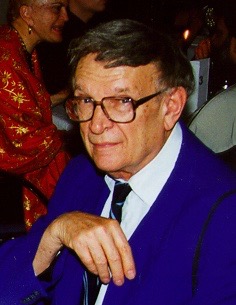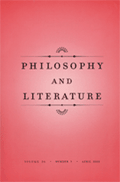
Aesthetics is the branch of philosophy concerned with the nature of beauty and the nature of taste; and functions as the philosophy of art. Aesthetics examines the philosophy of aesthetic value, which is determined by critical judgements of artistic taste; thus, the function of aesthetics is the "critical reflection on art, culture and nature".

Literary theory is the systematic study of the nature of literature and of the methods for literary analysis. Since the 19th century, literary scholarship includes literary theory and considerations of intellectual history, moral philosophy, social philosophy, and interdisciplinary themes relevant to how people interpret meaning. In the humanities in modern academia, the latter style of literary scholarship is an offshoot of post-structuralism. Consequently, the word theory became an umbrella term for scholarly approaches to reading texts, some of which are informed by strands of semiotics, cultural studies, philosophy of language, and continental philosophy.

Literary criticism is the study, a genre of arts criticism, evaluation, and interpretation of literature. Modern literary criticism is often influenced by literary theory, which is the philosophical discussion of literature's goals and methods. Though the two activities are closely related, literary critics are not always, and have not always been, theorists.

Comparative literature is an academic field dealing with the study of literature and cultural expression across linguistic, national, geographic, and disciplinary boundaries. Comparative literature "performs a role similar to that of the study of international relations but works with languages and artistic traditions, so as to understand cultures 'from the inside'". While most frequently practised with works of different languages, comparative literature may also be performed on works of the same language if the works originate from different nations or cultures in which that language is spoken.
New Criticism was a formalist movement in literary theory that dominated American literary criticism in the middle decades of the 20th century. It emphasized close reading, particularly of poetry, to discover how a work of literature functioned as a self-contained, self-referential aesthetic object. The movement derived its name from John Crowe Ransom's 1941 book The New Criticism.

John Hospers was an American philosopher and political activist. Hospers was interested in Objectivism, and was once a friend of the philosopher Ayn Rand, though she later broke with him. In 1972, Hospers became the first presidential candidate of the Libertarian Party, and was the only minor party candidate to receive an electoral vote in that year's U.S. presidential election.
René Wellek was a Czech-American comparative literary critic. Like Erich Auerbach, Wellek was an eminent product of the Central European philological tradition and was known as a vastly erudite and "fair-minded critic of critics."

Roman Witold Ingarden was a Polish philosopher who worked in aesthetics, ontology, and phenomenology.

Gregory Paul Currie FAHA is a British philosopher and academic, known for his work on philosophical aesthetics and the philosophy of mind. Currie is Professor of Philosophy at the University of York and Executive Editor of Mind & Language.

Callaloo, A Journal of African Diaspora Arts and Letters, is a quarterly literary magazine established in 1976 by Charles Rowell, who remains its editor-in-chief. It contains creative writing, visual art, and critical texts about literature and culture of the African diaspora, and is the longest continuously running African-American literary magazine. Notable writers published include Ernest Gaines, Rita Dove, Yusef Komunyakaa, Octavia Butler, Alice Walker, Lucille Clifton, Edwidge Danticat, Thomas Glave, Samuel Delany, and John Edgar Wideman. It is well known for connecting Black artists from different cultures and sponsoring upcoming writers. It has been published by the Johns Hopkins University Press since 1986.
This is an alphabetical index of articles about aesthetics.

Philosophy and Literature is an academic journal founded in 1977 by Denis Dutton. It explores the connections between literary and philosophical studies by presenting ideas on the aesthetics of literature, critical theory, and the philosophical interpretation of literature. The journal, which has been characterized as "culturally conservative", aims to challenge "the cant and pretensions of academic priesthoods by publishing an assortment of lively, wide-ranging essays, notes, and reviews that are written in clear, jargon-free prose".
Garry L. Hagberg is an author, professor, philosopher, and jazz musician, He is currently the James H. Ottaway Jr. Professor of Philosophy and Aesthetics at Bard College.
Richard Shusterman is an American pragmatist philosopher. Known for his contributions to philosophical aesthetics and the emerging field of somaesthetics, currently he is the Dorothy F. Schmidt Eminent Scholar in the Humanities and Professor of Philosophy at Florida Atlantic University.
Viśvanātha Kavirāja, most widely known for his masterpiece in aesthetics, Sāhityadarpaṇa, was a prolific poet, scholar, and rhetorician who ascended literary heights during the reigns of two successive Eastern Ganga rulers of Kalinga (India) – King Narasimha Deva IV and King Nishanka Bhanudeva IV. In absence of availability of exact dates of his birth and date, the periods of their rules is assumed to be the time of Viswanatha.

Ananta Charan Sukla was an Indian scholar of comparative literature, literary criticism, aesthetics, philosophy, and art history. He was the Founding Editor of Journal of Comparative Literature and Aesthetics and edited and published the journal for over 40 years. He specialized in comparative aesthetics, literary theory, philosophy of art, philosophy of literature, religion, mythology, and cultural studies. He was a professor of English and Comparative Literature at Sambalpur University, Sambalpur, Odisha.
Indian art evolved with an emphasis on inducing special spiritual or philosophical states in the audience, or with representing them symbolically.
The Budapest School was a school of thought, originally of Marxist humanism, but later of post-Marxism and dissident liberalism that emerged in Hungary in the early 1960s, belonging to so-called Hungarian New Left. Its members were students or colleagues of Georg Lukács. The school was originally oriented towards developing Lukacs' later works on social ontology and aesthetics, but quickly began to challenge the paradigm of Lukacsian-Marxism, thus reconstructing contemporary critical theory. Most of the members later came to abandon Marxism. The school also critiqued the "dictatorship over needs" of the Soviet states. Most of the members were forced into exile by the pro-Soviet Hungarian government.

Theory of Literature is a book on literary scholarship by René Wellek, of the structuralist Prague school, and Austin Warren, a self-described "old New Critic". The two met at the University of Iowa in the late 1930s, and by 1940 had begun writing the book; they wrote collaboratively, in a single voice over a period of three years. Its contents were based on their shared understandings of literature.
Ming Dong Gu is Katherine R. Cecil Professor in the School of Arts, Humanities, and Technology at the University of Texas at Dallas. He is a Chinese-born scholar of comparative literature and thought. He received his doctorate from the University of Chicago and has taught at various U.S. universities and colleges. He has a wide range of scholarly interests covering English literature, Chinese literature, comparative literature, literary theory, comparative thought East and West, fiction theory, hermeneutics, postcolonial studies, psychoanalytic criticism, and cross-cultural studies.









